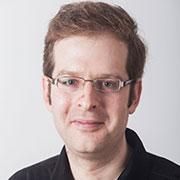Prof. Moshe Goldstein's research concerns the theory (both analytical and numerical) of nanoscale and low-dimensional quantum condensed matter systems, including: semiconductors, normal and superconducting metals, carbon-based materials, topological insulators, and ultracold atomic gases. These systems offer the fascinating challenge of understanding the interplay between quantum interference, strong correlations, topology, and nonequlibrium dynamics. Furthermore, they are important as the basic building blocks of future devices, including quantum simulators and quantum computers.
Research achievements and future directions include: 1) Topological states by dissipation: finding a recipe for using purely-dissipative dynamics for the creation of Gaussian topological states in ultracold atoms. The resulting states have peculiar response to artificial external electromagnetic fields and disorder. 2) Nonequilibrium quantum impurities: the accurate description of the nonequilibrium steady state properties of quantum impurities (such as an interacting quantum dot in the Kondo regime under the application of finite bias voltage) is a central open problem. Goldstein is developing numerically-exact algorithms for it, based on Wilson’s equilibrium Numerical Renormalization Group and a scheme he recently introduced to represent nonequilibrium conditions by additional Lindblad reservoirs. 3) Quantum simulation using superconducting circuits. While general-purpose quantum computers are still far from reach, the situation is better for the less flexible analogue quantum simulators. In collaboration with the Manucharyan lab at Maryland he is introducing several realistic superconducting nano-circuits which can reveal strongly-correlated quantum impurity physics, with sizeable nonlinear effects for even when probed by single microwave photons. 4) Strong correlations in oxide interfaces. The electronic structure of an interface could be very different from its constituent materials. A prominent example is the interface between the insulators SrTiO3/LaAlO3, which unexpectedly exhibits 2D electron-liquid properties with strong spin-orbit coupling, magnetism, and superconductivity. Measurements in Prof. Yoram Dagan’s lab at Tel Aviv have shown that these phenomena have a non-monotonic dependence on the back gate voltage, that is, on the carrier density. Goldstein is developing a theory to explain these.


